Finding Her Sound
Tiara Thomas started teaching herself how to play guitar at the age of 12.
She took her guitar with her to school, telling her classmates she would win a Grammy one day before she knew how to play the instrument. At the 63rd annual Grammy Awards earlier this year, Thomas proved her 12-year-old self and her classmates right.
“I was speaking into existence,” Thomas said while speaking to Gabriel Tait, associate professor of journalism, for the David Letterman Distinguished Professional Lecture and Workshop Series in Sursa Performance Hall Sept. 20.
Thomas, 2012 alumna and Grammy and Academy award winner, won the Grammy Award for Song of the Year for her collaboration with H.E.R. on her 2021 single “I Can’t Breathe,” written in response to the death of George Floyd.
While Thomas’ musical career has taken her on the journey of winning two of the most prestigious awards in the music industry, the path she took to achieving what she has is one full of positive experiences and tough obstacles.
Thomas had never played an instrument before her first guitar, but she knew there was something inside of her that drew her to its creative possibilities. While in high school, she started playing for a public audience.
“I did talent shows in high school and played in different coffee shops around Indianapolis,” Thomas said while speaking with Emerging Media and Design graduate students. “I was just performing because I liked it. I found the music, and I loved it.”
When Thomas got to Ball State as a telecommunications major, she said she hoped to use the skills she learned to land an internship with MTV or a radio station, where she planned to promote her own original songs to make her way into the music scene.
Stan Sollars, senior lecturer of telecommunications, taught Thomas in his TCOM 330 course, where she was always “pleasant, bright and focused.” Sollars said he noticed Thomas had a musical interest, as many of his other students do, too, and one thing he makes sure to teach his students is that they are in control of their own destiny.
“I always make it a point to say to any of my students, ‘You can do whatever it is you choose to do. The only person you need permission from to do that is yourself,’” Sollars said.
In the Department of Telecommunications, Sollars said he emphasizes the fact that students are storytellers. Whether it be through song, a newscast or a written story, he said, storytellers have the ability to help someone through their day.
“Of course, [Thomas] fit right in with that,” Sollars said. “Her aim was to write great songs — songs that mean something to people. And that is what she did.”
As a student, Thomas turned to YouTube to share her songs, recording videos of herself in the LaFollette stairwell and uploading them to her personal channel despite receiving noise complaints.
“I posted my very first YouTube video of me singing and playing guitar,” Thomas said. “Once I saw the reaction from doing that, I just started posting these covers all the time.”
She would stop students on their way to class and ask if they wanted to hear her play a song.
“I gained this sense of confidence,” Thomas said. “Maybe it was something about being on my own, not being under my parents, but I gained a sense of confidence in myself as an artist, and I was really willing to put myself out there.”
College was when Thomas started to really see herself as an artist, she said, and she felt inspired to start pursuing that creative side of herself. She began writing more original songs and focusing on creating her own sound.
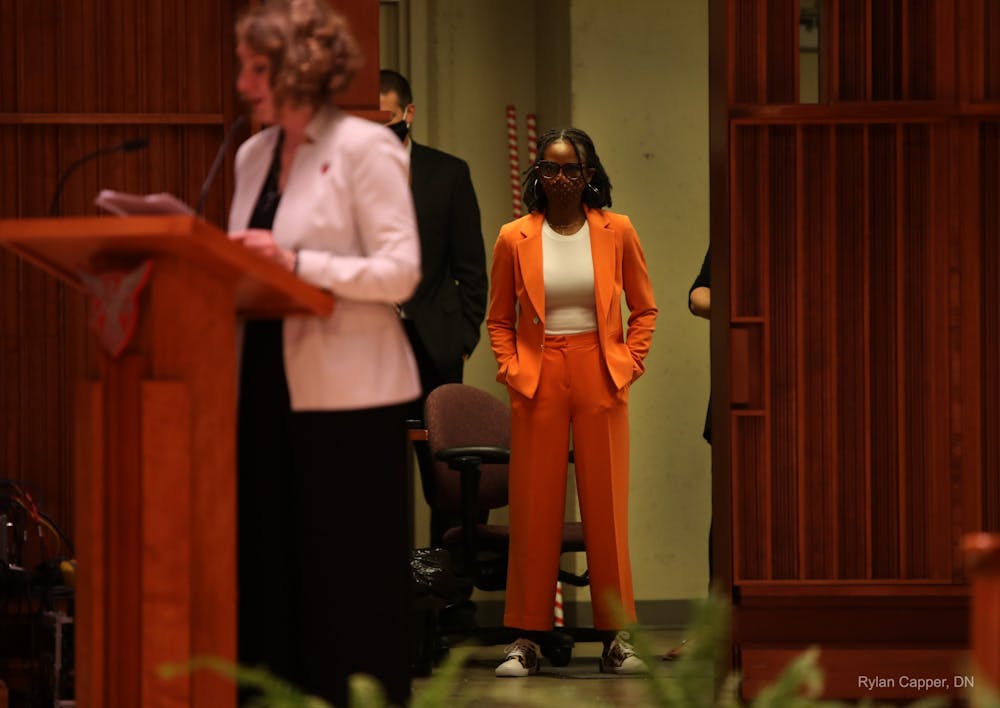
Managing Music
While a student at Ball State, Thomas said she didn’t really know what she was doing. Her goal was to figure it out as time went along, and navigating the music industry has been a similar experience.
“Being in the music industry, you don’t really know what it’s like until you experience certain things,” Thomas said. “When you’re a girl from Indiana who doesn’t really know anything and then jump into the music industry, it’s a whole different world.”
Thomas’ first experience in the music industry came after a spring break trip to Atlanta her sophomore year, where she got into a nightclub called Compound and met Wale, an American rapper.
Wale later introduced Thomas to his business partner, who gave Thomas his phone number and told her to leave a voicemail that night of her singing while playing the guitar. After getting back to her hotel room, Thomas made the call, recorded herself singing and waited for a response.
The next morning, she woke up to a text, “Sounds pretty good.”
A few weeks later, Thomas was asked to work with Wale in the studio.
“That’s when I took my guitar to the studio, and I played Wale a song that I wrote when I was 15,” Thomas said. “He was like, ‘I love that song.’”
Wale ended up putting Thomas’ song on his mixtape “More About Nothing” and calling it “The Cloud.” That was the moment Thomas made her start in the music industry, but no matter how many people told her what it would be like, she said she stepped into an industry full of unknowns.
In an industry driven by money, not everybody is your friend, she said, and there’s no “sheltered feeling” being in it on your own.
“We’re like wolves, really,” Thomas said. “It’s a lot of learning as you go along.”
For a lot of artists, Thomas said being in the music industry is an up-and-down roller coaster rather than a straight shot to the top. But, despite the highs and lows, Thomas said the most important thing to do is remain persistent.
“A lot of people get discouraged, and they give up, or they get really jaded by the industry,” Thomas said. “One of the challenging things is being persistent, feeling discouraged and keeping it going. The challenge is really still believing in yourself.”
Staying Persistent and Consistent
After Thomas’ debut on Wale’s mixtape in 2010, she collaborated with him on a song called “Bad,” which was released in 2013 and has been certified three times Platinum by the Recording Industry Association of America.
“I was covering these rap songs, playing these songs on the guitar and singing the lyrics really pretty,” Thomas said. “That’s how I actually ended up coming up with the hook [for ‘Bad’]. I can’t even tell you how many times we listened to [the song] that night.”
While “Bad” took off, Thomas said she still struggled to make a name for herself in the music industry. For nearly four years, Thomas was “broke and depressed,” but she continued to remain persistent and write songs to send to different record labels.
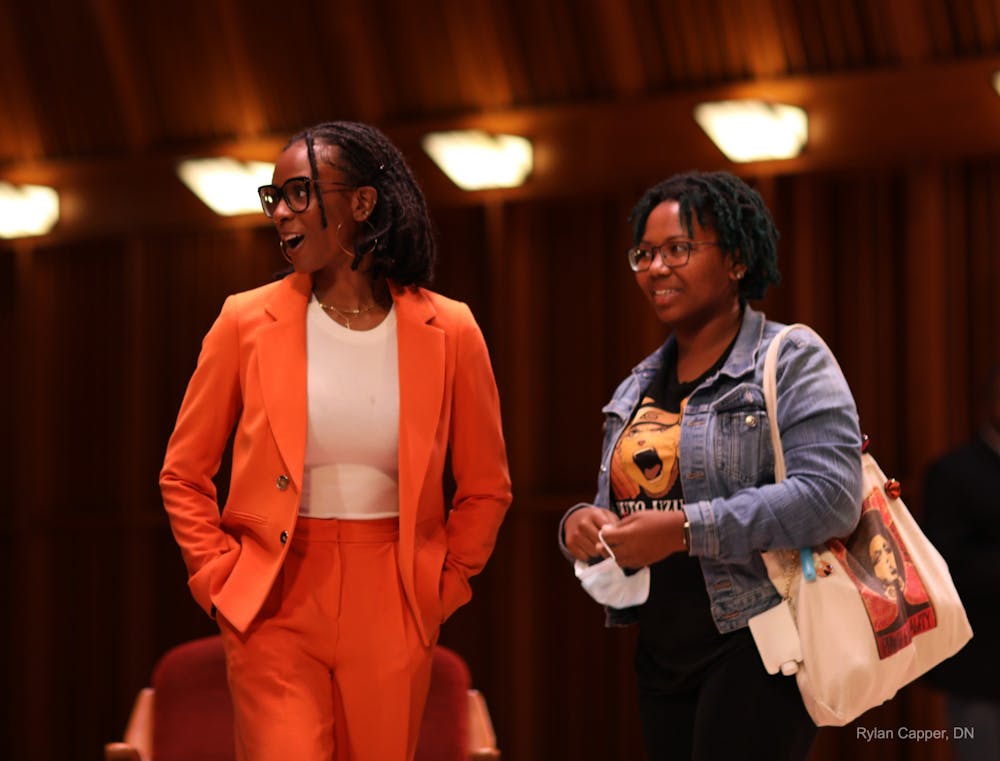
Throughout her songwriting, Thomas said she was inspired by artists like Kirk Franklin, her No. 1 top streamed artist on Spotify. Growing up, Thomas was influenced by a lot of the music her father listened to, she said, and she held onto the inspiration it gave her while writing her own music.
“I kind of took certain aspects with me,” Thomas said. “It’s easier for you to be more creative when you know different types of music.”
In addition to being inspired by other musicians, Thomas said she would look for inspiration in her everyday life — through the names of street signs or couples on the street. She was constantly searching for the inspiration to keep going.
“I just had to keep pushing and writing things, even when I felt really depressed,” Thomas said. “I didn’t know what was next for me. I just kept writing songs because, at the end of the day, I knew I was dope, and I’m going to write dope music.”
After working with H.E.R. for four years on her latest album, “Back of My Mind,” Thomas said she felt like she had a purpose again. The album dropped last June, and Thomas helped write half of its songs.
“I just had to push through and keep believing in myself,” Thomas said. “That’s my big underdog story.”
Sharing Her Story
Thomas said she feels she has an obligation coming back to Ball State to speak to students about what it means to chase after their dreams despite the situation they may find themselves in. She hopes her story inspires students to continue pushing themselves to pursue what makes them feel whole.
There were times when Thomas felt discouraged as a student, she said, as balancing her school and work life consisted of performing on the weekends and getting tutored during the week. One of the lessons she hopes to share with students is how important it is to “just keep going.”
“I think it's really important for me to come back and talk to the students just so they can see students that felt the way I felt when I was in Ball State can go off and do this … I have this vision for myself, and I don’t want to stop until I accomplish what I’m trying to accomplish,” Thomas said, “even if you are in Indiana or there’s a million other people trying to do what you want to do.”
Sollars said those working in the Department of Telecommunications are incredibly proud of Thomas’ success and awards, but what matters most to them is that she is content.
“The Grammy and Oscar [awards] are fantastic — we’re all very proud of her,” Sollars said. “But that’s not really the point. The point is she is happy doing what she wants to do, and, through winning those awards, she now has visibility to be able to go out and help people. That's why she was here visiting with us — she wanted to come and pay it forward to our current students.”
Silvie Coffey, senior public relations major, started listening to Thomas when she was 16 but said she never knew Thomas was an alumna until Tait mentioned it in one of her classes.
“I was like, ‘How did I not know she went here?’ Coffey said. “She’s not one of the prominent figures listed as one of Ball State’s alumni, but she has a Grammy. She has a three-times Platinum record.”
Coffey said she hopes to go into the public relations side of the music industry and attended Thomas’ talk at Sursa Performance Hall to learn more about what a career in that field may look like.
“Being able to see her talk is amazing,” Coffey said. “I want to be able to see what she needs and what happens in [the industry].”
Sophomore theater and telecommunications major Riley Gilmer first heard about Thomas after watching the 2021 Grammy Awards and learned in class the day after that Thomas had graduated from Ball State. Gilmer said she was inspired by Thomas’ success story and was eager to hear her speak in person.
“It inspires me hearing the success stories from Ball State and seeing the different paths that people can take,” Gilmer said. “I just want to be a part of it, listen to the opportunities that she saw while she was on campus that she felt were most worthwhile to her. I want to learn from her experiences, see how they’re most applicable to me and hopefully learn from the things that she’s been able to do.”
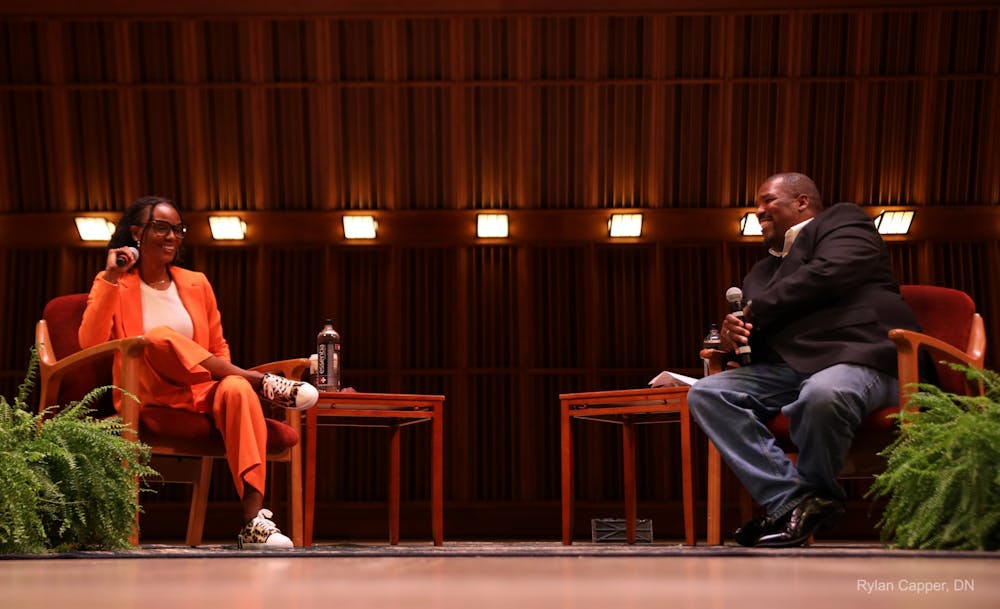
One of the messages Thomas said she hopes she can get across to students is to speak their mind. Thomas has a consistency of being outspoken through her lyrics, especially in relation to politics and female liberation. One of her songs, “Retro 1’s,” touches specifically on the idea that male musicians can often say whatever they want in their songs, whereas women struggle to do the same.
“I feel like women should be able to do that, too — speak from a place of empowerment,” Thomas said. “I feel like women should be able to express themselves in the same way everyone expresses themselves. I’ve always kind of written my music that way.”
Thomas said she first realized being outspoken in her lyrics would work well for her when “Bad” was released in 2013. The reaction after the song’s release helped Thomas realize people wanted her to be honest in her songwriting.
“My name was trending on Twitter, and people were saying, ‘This is the best song I’ve ever heard in my life,’” Thomas said. “That night, I realized that people want to hear you be honest and say things that they’re feeling. That was kind of a confirmation for me, and I just stuck with that.”
The key to writing an “amazing” song, Thomas said, is to write what everybody else is thinking, but in a way no one else has said it before. In her songwriting process, Thomas takes what people are talking about and tries to say it in a less common way to make her songs unique.
“When people hear that, they can automatically relate to you because it doesn’t sound like you’re just saying a cliché thing,” Thomas said. “They will relate to how authentic and honest and raw you are. You never know if you’re telling someone’s life story.”
Despite her drive to be an outspoken creator, Thomas said she understands how difficult it can be to feel ready and willing to “put yourself out there,” especially in the age of social media when comparison seems inevitable.
Her hope for speaking to Ball State students is to inspire them to remain true to themselves and continue to believe in their dreams no matter their situation, she said, because ultimately, what makes you succeed is your overall drive to do so.
“You look at other people your age, and they seem like they’re doing a better job than you,” Thomas said. “Or maybe you’re afraid to put yourself out there because you’re afraid of what people will say about you. If you’re scared, if you feel fearful, do a scary thing. Not doing it is not an option.”
Contact Taylor Smith with comments at tnsmith6@bsu.edu or on Twitter @taywrites.

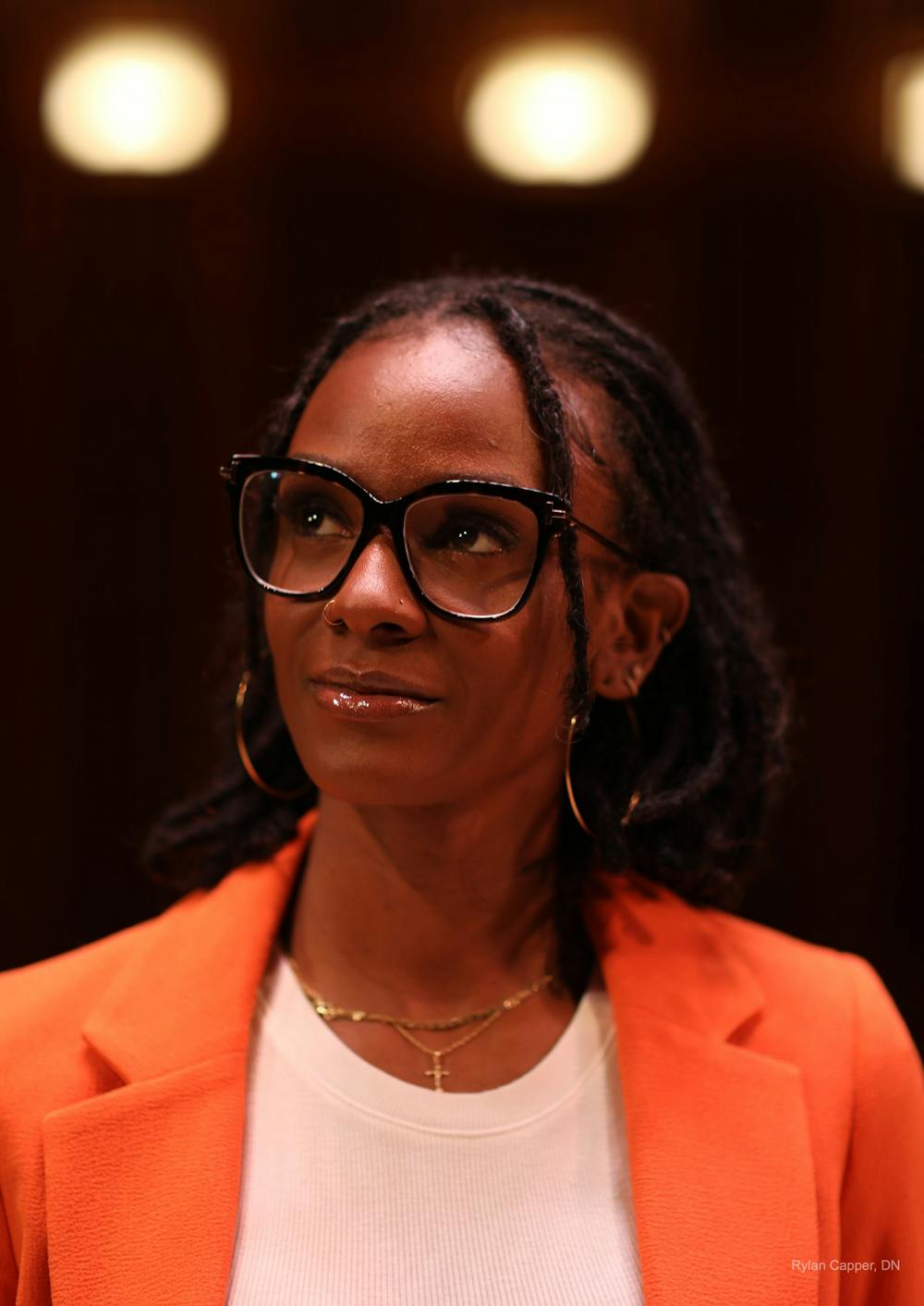
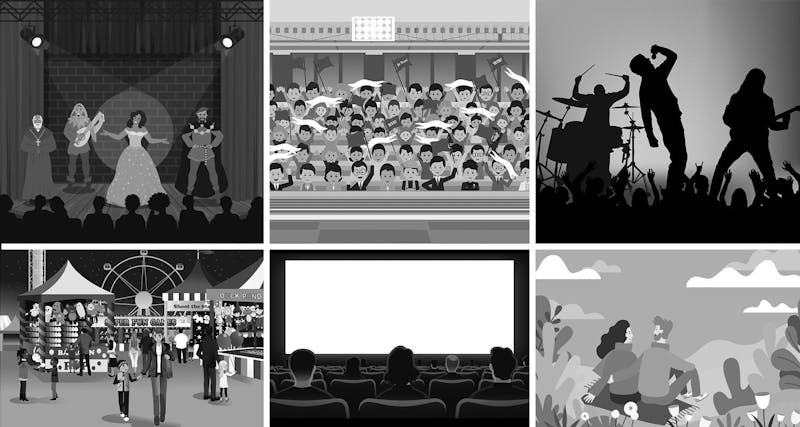
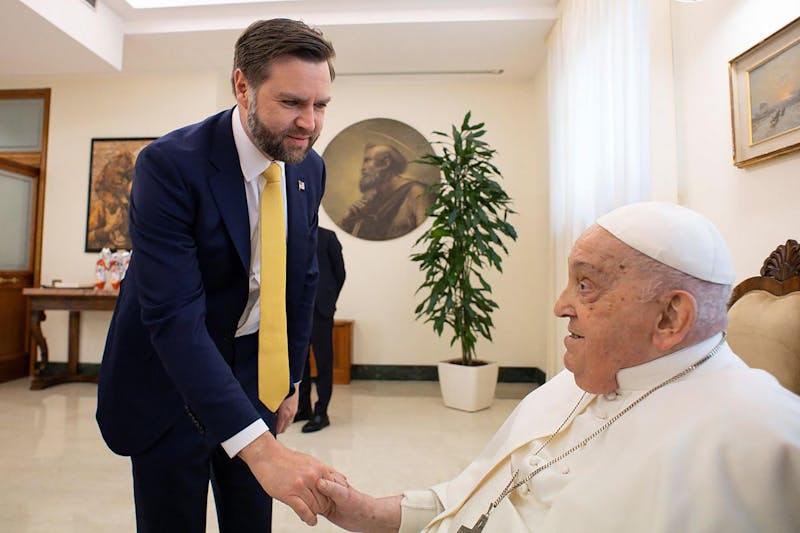
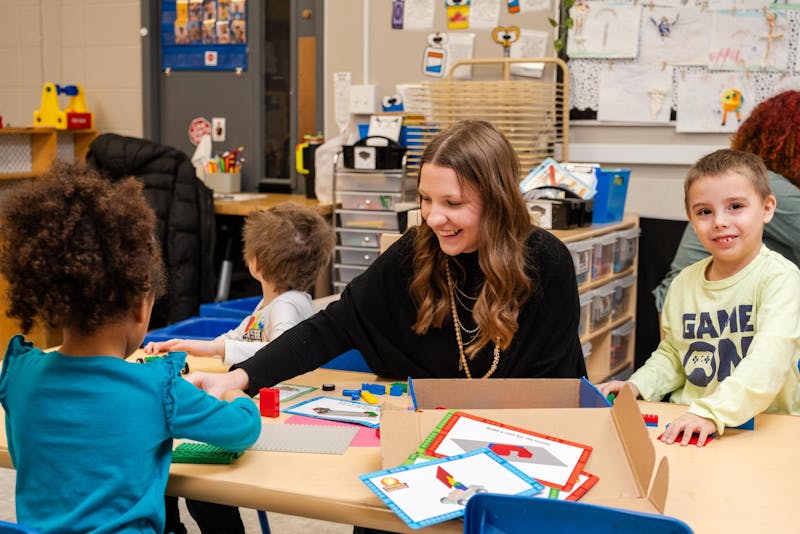
The Daily News welcomes thoughtful discussion on all of our stories, but please keep comments civil and on-topic. Read our full guidelines here.